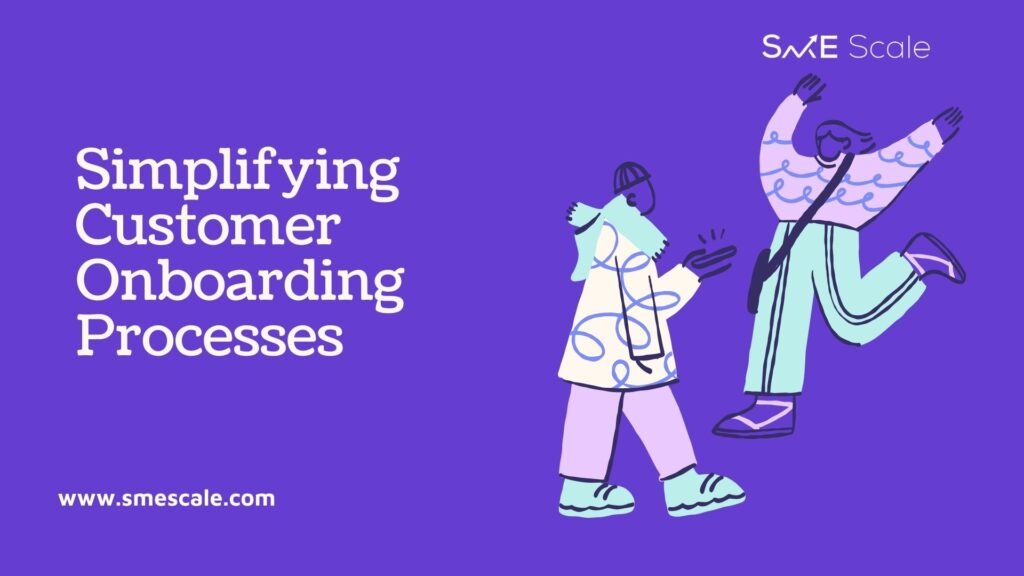Simplifying Customer Onboarding Processes for SMEs: A Pathway to Long-Term Success

For small and medium-sized enterprises (SMEs), customer onboarding is a crucial yet often overlooked step in establishing lasting client relationships. The onboarding process significantly impacts first impressions, customer satisfaction, and long-term retention, which are all key factors in scalable business growth. SME Scale provides tools and guidance for SMEs aiming to create a streamlined onboarding experience that resonates with customers. This blog explores the importance of customer onboarding, leveraging a real-life case study to demonstrate how the right onboarding approach can drive customer loyalty and growth.
Why Customer Onboarding Matters for SMEs
Customer onboarding is the process of guiding new clients through the initial stages of a service or product, ensuring they understand its value, functionality, and how it benefits their business. Effective onboarding reduces customer frustration, increases satisfaction, and ultimately strengthens the relationship between the customer and the brand. According to studies, companies with an efficient onboarding process see 50% higher new customer retention rates.
Key Elements of Effective Onboarding
A simplified onboarding process helps SMEs overcome common challenges like limited resources and time constraints. SME Scale emphasizes several essential components for successful onboarding:
Clear Communication: Ensure clients have a transparent understanding of what they’re signing up for and set clear expectations from the beginning. Using CRM tools like HubSpot or Salesforce can automate these communications, providing timely updates and reminders.
Personalized Guidance: Customization is vital for engaging customers and making them feel valued. Segment clients based on their needs and provide tailored instructions to optimize their experience with your service or product.
Utilize Technology and Automation: Automation tools simplify repetitive tasks in the onboarding process, allowing SMEs to focus on personalized interactions. AI-driven onboarding platforms, for example, can walk customers through basic setup processes, answering common questions and personalizing the experience based on user data.
Real-Life Case Study: How SME Scale Helped FinTechPro Simplify Onboarding
To illustrate the impact of a streamlined onboarding process, let’s examine how SME Scale assisted a growing financial technology startup, FinTechPro, in refining its customer onboarding experience.
1. Initial Onboarding Challenges
FinTechPro provides software solutions for small businesses, helping them automate payroll and financial management. However, as the company scaled, they noticed high churn rates among new users within the first month. Feedback revealed that clients found the setup process complicated and were overwhelmed by the software’s features. The lack of a structured onboarding process was leading to client frustration and abandonment.
2. Implementing a Structured Onboarding Process
SME Scale recommended a three-step onboarding framework for FinTechPro:
Step 1: Pre-Setup Orientation
SME Scale helped FinTechPro integrate a pre-setup tutorial for new clients. This short orientation session introduced customers to the platform’s core features, providing a high-level overview rather than diving into the details immediately. Psychologically, this helped ease clients into the process, reducing the initial overload of information—a concept tied to the psychological phenomenon of information aversion, where individuals avoid complex or overwhelming information.
Step 2: Guided Product Walkthrough
During the setup phase, FinTechPro implemented an AI-driven walkthrough tool that guided users through key functionalities step-by-step. Using SME Scale’s AI-based onboarding tools, FinTechPro created personalized prompts and tutorials based on each client’s industry and needs, enabling clients to interactively learn the software’s functions. This guided experience drew on the foot-in-the-door psychological principle, where small, progressive actions build user familiarity and commitment to the software.
Step 3: Continuous Support with CRM Integration
Finally, SME Scale integrated FinTechPro’s CRM system with its onboarding process to deliver automated follow-ups and support. This proactive communication ensured clients could quickly reach out with questions or receive guidance based on their usage patterns. Using this method helped FinTechPro address issues before they escalated, resulting in a lower customer churn rate.
The Psychology of Successful Onboarding
Customer psychology plays a pivotal role in effective onboarding. Here are some psychological principles that contributed to FinTechPro’s success:
Loss Aversion: This principle highlights that people are more motivated to avoid losses than achieve equivalent gains. By emphasizing the time and resource-saving benefits of using FinTechPro’s software early on, the onboarding process minimized perceived risks and gave customers a sense of security, increasing their willingness to engage fully.
Social Proof: SME Scale recommended displaying testimonials and case studies during the onboarding process. This reassured clients that other businesses had successfully used the platform, easing initial anxieties and providing a sense of community.
Reciprocity: FinTechPro offered new clients a free one-month support package, which gave users additional help at no extra cost. The reciprocity principle, where people feel compelled to return a favor, encouraged clients to stay with the platform longer, increasing their likelihood of renewal and long-term commitment.
Key Takeaways for SMEs on Simplifying Customer Onboarding
FinTechPro’s onboarding overhaul offers several lessons for SMEs looking to optimize their processes:
Automate Where Possible: Automation saves time and reduces the strain on human resources. It also ensures that customers receive consistent, high-quality guidance throughout the onboarding process.
Prioritize User Experience with Personalization: Tailoring onboarding to each customer’s needs enhances their satisfaction and loyalty. Even small adjustments, like segmenting clients by industry, can improve the overall experience.
Use Psychological Insights to Build Trust: Incorporating psychological principles like social proof and loss aversion can strengthen clients’ trust in your business and improve their long-term satisfaction.
Conclusion: Creating a Lasting Impact through Effective Onboarding
An effective customer onboarding process is invaluable for SMEs aiming to foster loyalty and growth. By combining structured processes, technology, and psychological insights, SMEs can simplify the onboarding experience and turn new clients into long-term partners. SME Scale’s approach to FinTechPro’s onboarding highlights the importance of tailored, proactive, and automated solutions that align with customer psychology. This model can empower other SMEs to retain clients more effectively, setting a strong foundation for sustainable growth.


